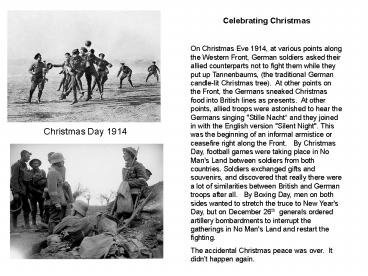Celebrating Christmas PowerPoint PPT Presentation
1 / 23
Title: Celebrating Christmas
1
Celebrating Christmas On Christmas Eve 1914, at
various points along the Western Front, German
soldiers asked their allied counterparts not to
fight them while they put up Tannenbaums, (the
traditional German candle-lit Christmas tree).
At other points on the Front, the Germans sneaked
Christmas food into British lines as presents.
At other points, allied troops were astonished to
hear the Germans singing "Stille Nacht and they
joined in with the English version "Silent
Night". This was the beginning of an informal
armistice or ceasefire right along the Front.
By Christmas Day, football games were taking
place in No Man's Land between soldiers from both
countries. Soldiers exchanged gifts and
souvenirs, and discovered that really there were
a lot of similarities between British and German
troops after all. By Boxing Day, men on both
sides wanted to stretch the truce to New Year's
Day, but on December 26th generals ordered
artillery bombardments to interrupt the
gatherings in No Man's Land and restart the
fighting. The accidental Christmas peace was
over. It didnt happen again.
Christmas Day 1914
2
(No Transcript)
3
In 1916 some people in Hackney put up a shrine in
the street to remember their families and friends
who were away at the War. Soon the idea spread
all over the country and even Queen Mary went to
visit the shrines in the East End of London.
4
A chaplain leads a service of worship for nurses
and soldiers aboard a troop ship.
5
Toc H
Church Army Hut at Poperinge 1918
6
(No Transcript)
7
An army chaplain takes the personal belongings
from the bodies of the dead soldiers to be sent
home to their families. Each Battalion in the
British Army had a chaplain. They would also
undertake practical tasks, such as writing
letters for wounded men and to the next of kin of
the soldiers who had been killed.
8
An Army chaplain tending a soldier's grave.
Carnoy Valley, July 1916.
9
Army chaplains conducted services of worship for
troops wherever they could this one is leading
a service from the cockpit of an airplane.
10
it has just fallen to my lot to prepare a
deserter for his death. That meant breaking the
news to him helping him with his last letters
passing the night with him on the straw of his
cell and trying to prepare his soul for meeting
God witnessing the execution and burying him
immediately. Chaplain Guy Rogers
On average, one soldier was shot by firing squad
for every week of the War.
11
Soldiers gather together for a thanksgiving
service in the ruins of the cathedral in Chambrai
after they have taken the town.
12
A British Chaplain prays with a badly wounded
German prisoner.
13
An American Army chaplain helps a young German
prisoner-of-war As Germany ran out of fit
soldiers in 1918, they had to send very young
soldiers to battle.
14
Senior Jewish Chaplain with the British Troops -
Michael Alder
15
Le Pelerin was a weekly French Catholic
magazine. French priests were called up to fight
just like other men. The French Government did
not give them any special role, but the priests
acted as unofficial chaplains for those who
wanted help. Here a priest-soldier prays for a
dead soldier.
16
All the different countries armies had their own
chaplains - this is a Greek Orthodox Christian
Chaplain of the II Infantry Division in World War
One called Father Eleutherios Nuphrákes.
Australian Chaplain wearing a small box
respirator
17
German Troops in Africa
The popular pastor Division Kapuzienerpater
Norbert Stumpf, the "great sin cannon" .
Chaplains with the German Army
18
German Soldiers in World war One all wore a belt
buckle with the motto Gott Mit Uns which means
God Is With Us.
19
Chaplain Geoffrey Studdert Kennedy 'Woodbine
Willy' There's a soul in the Eternal,Standing
stiff before the King.There's a little English
maidenSorrowing.There's a proud and tearless
woman,Seeing pictures in the fire.There's a
broken battered bodyOn the wire.
Waste of Muscle, waste of Brain, Waste of
Patience, waste of Pain, Waste of Manhood, waste
of Health, Waste of Beauty, waste of
Wealth, Waste of Blood, and waste of Tears, Waste
of Youths most precious years, Waste of ways the
Saints have trod, Waste of Glory, waste of God
- War!
20
Neuve Chapelle The Christ of the Trenches
When fighting in Europe British soldiers were
impressed by the number of wayside crosses all
over the countryside this gave people the idea
that every British village should have its own
monument to remember those who died in the War.
21
They shall not grow old, as we that are left grow
old Age shall not weary them, nor the years
condemn. At the going down of the sun and in the
morning We will remember them.
March
Haddenham
Amiens
Gallipoli
Cambridge
22
(No Transcript)
23
The Cenotaph in London, 11th November, 1920 King
George V laid the first wreath in honour of those
who didnt come home

